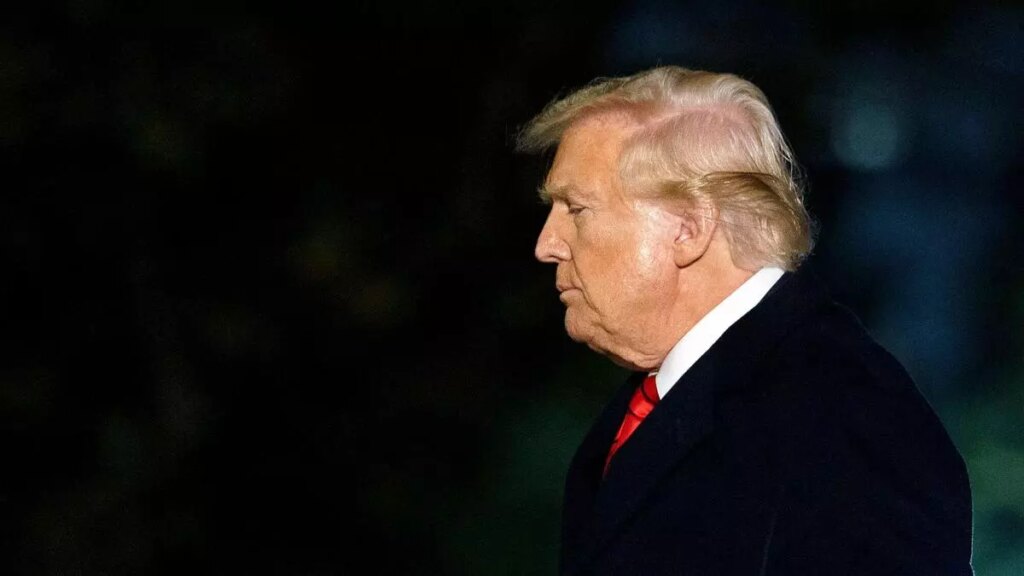President Donald Trump said he wants to enact across-the-board tariffs that are “much bigger” than 2.5 per cent, the latest in a string of major signals Monday that he’s preparing widespread levies to reshape US supply chains.
“I have it in my mind what it’s going to be but I wont be setting it yet, but it’ll be enough to protect our country,” Trump told reporters Monday night.
Asked about a report that incoming Treasury Secretary Scott Bessent favored starting with a global rate of 2.5 per cent, Trump said he didn’t think Bessent supported that and wouldn’t favor it himself. He said he wanted a rate “much bigger” than 2.5 per cent.
Trump spoke aboard Air Force One while he flew back to Washington, DC, from a Florida speech where he also pledged tariffs on specific sectors, including semiconductors, pharmaceuticals, steel, copper and aluminum. He also strongly suggested he could also impose them on automobiles from Canada and Mexico, countries he’s already threatened with 25 per cent across-the board tariffs as soon as Feb. 1.
“As tariffs on other countries go up, taxes on American workers and businesses will come down and massive numbers of jobs and factories will come home,” Trump said Monday as he spoke to a gathering of House Republicans at his Doral resort in Miami, in a speech where he praised the tariff-heavy US approach at the turn of the 20th century.
“Remember, again, the word ‘tariff.’ We’re going to protect our people and our businesses, and we’re going to protect our country, with tariffs,” Trump added.
The remarks to lawmakers are the latest sign that Trump sees tariffs as a pillar of the Republican push to also remake the tax system. He repeated a call for Republicans to cut the corporate tax rate to 15 per cent, from the current 21 per cent, for companies that make their goods in America.
Trump’s threat of semiconductor tariffs also comes hours after investor concern about Chinese artificial-intelligence startup DeepSeek rattled markets and erased billions from Nvidia Corp.’s market capitalization. Trump has argued that tariffs will help keep and build US manufacturing of the advanced chips compared to a subsidy program championed by former President Joe Biden.
The latest DeepSeek model caused shockwaves when independent tests showed it as competitive with OpenAI and Meta Platforms Inc.’s resource-intensive models.
Trump’s remarks ran in stark contradiction to market speculation that his abstention from immediate tariffs when he took office again was a sign that he might soften his stance.
“If you want to stop paying the taxes or the tariffs you have to build your plant right here in America. That’s what’s going to happen at record levels,” he said.
Trump’s speech came after a weekend where he threatened tariffs of as much as 50 per cent on Colombia unless they agreed to accept migrants being deported by the US. Trump agreed to hold off only after the South American government backed down.
The new president reiterated to House Republicans that any countries that refuse his deportees would be subject to the same tariff-and-sanction threat Colombia narrowly avoided.
A top Trump economic aide signaled Monday that Trump’s tariff push is part of a broader push. National Economic Council Director Kevin Hassett pointed to the Colombia example, and hinted that Trump is also still considering across-the board tariffs.
“Whatever tariff that might be is going to be in addition to whatever President Trump does in the future when he’s thinking about an overall tariff,” Hassett said Monday in an interview with Fox Business host Larry Kudlow, who held Hassett’s current role during Trump’s first term.
“If you look at tariffs as part of an overall strategy, you’re going to see, as President Trump says, a golden age and it’s going to be the biggest supply side reform that America’s ever seen,” Hassett said.
Trump singled out several sectors in his speech. He complained at length about auto imports both from Canada and Mexico.
“They send us millions of cars; we don’t need them for that,” he said of Canada, the country that’s the top US export market. “We want to have the cars made in Detroit or South Carolina or many other locations.” Trump added: “The auto workers voted for me and I have an obligation to do what’s right, and I’m going to do that.”
He sang the praises of steel tariffs that he implemented in his first term and said he’d be “placing tariffs on steel, aluminum and copper and things that we need for our military,” without elaborating. “We have to bring production back to our country.”
Meanwhile, Trump heralded news of DeepSeek’s apparent progress in artificial intelligence as “a positive” while also delivering a warning.
“The release of DeepSeek AI from a Chinese company should be a wake-up call for our industries that we need to be laser-focused on competing to win,” Trump continued. “Because we have the greatest scientists in the world, even Chinese leadership told me that. They said you have the most brilliant scientists in the world.”
The US has tried to curb China’s progress on AI by banning the export of certain advanced semiconductor technologies and also limiting sales of advanced Nvidia AI chips. But DeepSeek’s progress suggests Chinese AI engineers have found a way to work around the export bans, focusing on greater efficiency with limited resources.
Trump said he had been reading about the company and saw their apparent breakthrough as “good, because you don’t have to spend as much money.”
More stories like this are available on bloomberg.com

